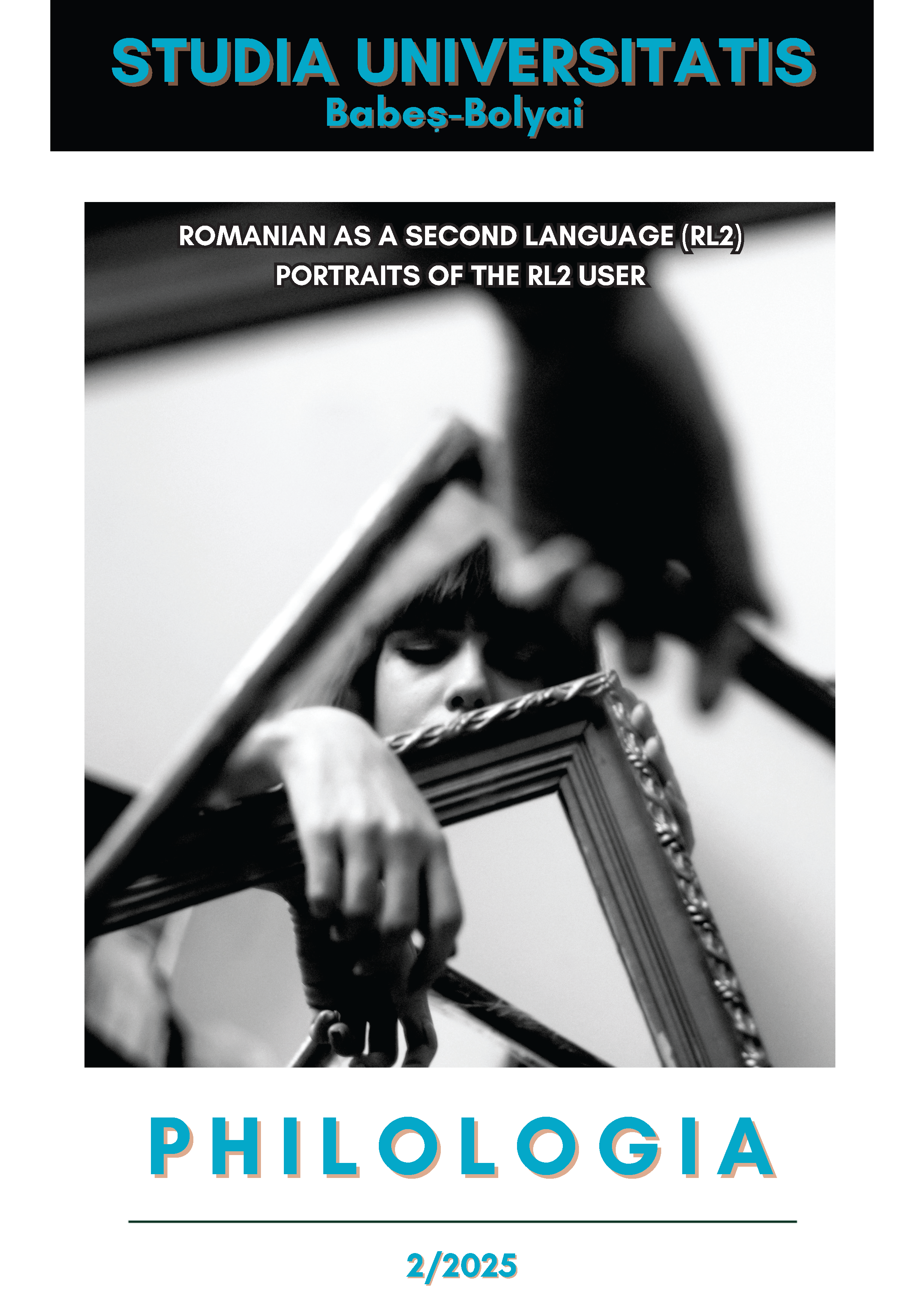SOCIO-CULTURAL DYNAMICS OF ROMANIAN THROUGH THE LENS OF RL2 LEARNERS
DOI:
https://doi.org/10.24193/subbphilo.2025.2.06Keywords:
limbă de prestigiu, limbă „minoră”, RL2, comunitate, identitate socialăAbstract
Socio-cultural Dynamics of Romanian through the Lens of RL2 Learners. This research investigates the social and cultural dynamics of the Romanian language, with a particular emphasis on its status as a prestige language within the RL2 learner communities. Using a mixed-methods research design, the study combines quantitative data with qualitative data obtained from observations and a questionnaire addressed to RL2 learners. Shifting the role played by the Romanian language from being a ‘minor’ language to being a prestige language within an RL2 community of practice through cultural immersion underscores the significance of social interactions in the language learning process. By offering a detailed understanding of the Romanian language within its cultural milieu, this study seeks to contribute to the portrayal of the RL2 learner profile.
Dinamica socio-culturală a limbii române prin filtrul vorbitorilor de RL2. Această cercetare investighează dinamica socială și culturală a limbii române, cu accent pe statutul său de limbă de prestigiu în cadrul comunităților de vorbitori de RL2. Folosind o metodă mixtă de cercetare, studiul îmbină date cantitative cu date calitative obținute din observații și dintr-un chestionar adresat vorbitorilor de RL2. Schimbarea rolului jucat de limba română de la o limbă „minoră” la o limbă de prestigiu în cadrul comunităților de vorbitori de RL2 subliniază importanța interacțiunilor sociale în procesul de învățare a unei limbi străine. Oferind o înțelegere detaliată a limbii române în mediul său cultural, acest studiu urmărește să contribuie la portretizarea profilului vorbitorului de RL2.
Cuvinte-cheie: limbă de prestigiu, limbă „minoră”, RL2, comunitate, identitate socială
Article history: Received 14 January 2025; Revised 2 April 2025;
Accepted 28 April 2025; Available online 10 June 2025;
Available print 30 June 2025.
References
Barton, David, and Carmen Lee. 2013. Language online: investigating digital texts and practices. Abingdon: Routledge.
Blommaert, Jan, and Ben Rampton. 2011. “Language and Superdiversity.” Diversities 13, no. 2: 1-20.
Cotoc, Alexandra, and Anamaria Radu. 2024. “The Identity Repertoires of Romanian Microcelebrities. A Digital Ethnography Approach to Telling a Life Stort on Social Media.” Studia Universitatis Babeș-Bolyai Philologia, LXIX, no. 4: 349-372. DOI:10.24193/subbphilo.2024.4.16.
Darvin, Ron. 2016. “Language and Identity in the Digital Age.” In Routledge Handbook of Language and Identity, edited by Siân Preece, 163-178. London and New York: Routledge Taylor & Francis Group.
Domingo, Myrrh. 2016. “Language and Identity Research in Online Environments. A Multimodal Ethnographic Perspective.” In Routledge Handbook of Language and Identity, edited by Siân Preece, 541-557. London and New York: Routledge Taylor & Francis Group.
Gass, Susan M., and Larry Selinker. 1994. Second Language Acquisition: An Introductory Course. Mahwah, New Jersey, London: Lawrence Erlbaum Associates Publishers 10.2307/416225.
Hall, Stuart. 2019. “Cultural Identity and Diaspora.” In Essential Essays, Volume 2: Identity and Diaspora, edited by David Morley, 222-237. Duke University Press, https://doi.org/10.2307/j.ctv11smnnj.
Heidrich Uebel, Emily, Angelika Kraemer, and Luca Giupponi. 2023. “Sharing Less Commonly Taught Languages in the 21st Century.” In Sharing Less Commonly Taught Languages in Higher Education. Collaboration and Innovation, 1st edition, edited by Heidrich Uebel, Emily, Angelika Kraemer, and Luca Giupponi, 1-10. London: Routledge. https://doi.org/10.4324/9781003349631
Kakoyianni-Doa, Fryni, Monique Monville-Burston, Salomi Papadima-Sophocleous, and Freiderikos Valetopoulo (eds.). 2020. Langues moins Diffusées et moins Enseignées (MoDiMEs)/Less Widely Used and Less Taught Languages: Langues enseignées, langues des apprenants/Language Learners’ L1s and Languages Taught as L2s. vol. 14. Berlin: Peter Lang.
Patiño-Santos, Adriana, and Ana María Relaño-Pastor. 2018. “Storytelling in Globalized Spaces: A Linguistic Ethnographic Perspective." International Journal of the Sociology of Language, no. 250: 1-10.
Radu, Anamaria, and Alexandra Cotoc. 2024. “Branding with Language: Romanian as a Foreign Language on Instagram.” In Helsinki Romanian Studies Journal, 1: 27-41. https://doi.org/10.31885/her.1.1.003.
Shaw, Sara, Fiona Copland, and Julia Snell, 2015. “An Introduction to Linguistic Ethnography: Interdisciplinary Explorations.” In Linguistic Ethnography. Palgrave Advances in Language and Linguistics, edited by Sara Shaw, Fiona Copland, and Julia Snell, 1-13, London: Palgrave Macmillan. https://doi.org/10.1057/9781137035035_1
Torres, Sandra, and Justyna Drobnik-Rogers. 2024. Less-widely Taught Languages in UK Higher Education. New Perspectives on Languages. 10.56395/npl.v1i1.51.
Vertovec, Steven. 2007. “Super-diversity and its Implications.” Ethnic and Racial Studies 30, no. 6 (November): 1024-1054. DOI: 10.1080/01419870701599465
INTERNET SOURCES
Reel 1. edsta, Weird things Romanian say (Part 2), at: https://www.instagram.com/reel/C4tHXHVxJOn/?igsh=MWZhdjZobXowcGVyOA%3D%3D. Published: March 19, 2024
Reel 2. primal_gourmet, Come with me to the local farmers market in Brașov, Romania, at: https://www.instagram.com/reel/C82KhTZo-UA/?igsh=MTQwYTF5aWUwOTJkZQ%3D%3D. Published: June 30, 2024
Reel 3. lifeofisiah19, Nu poți face sarmale fără orez, at: https://www.instagram.com/reel/C48cQWvoJK5/?igsh=MWdmMm9yYzdsNHZrZA==. Published: March 25, 2024
Reel 4. Zm95z, Cel mai bun sfat din lume, at: https://www.instagram.com/reel/C7FDYxkiOPh/?igsh=anA4aGliZ3dvZGtr. Published: May 17, 2024
Reel 5. 5outhy, Meeting my tată socru [father-in-law] for the first time, at: https://www.instagram.com/reel/C2fipoAIQSH/?igsh=MXVwYjluY3lqcWRrcg%3D%3D. Published: January 24, 2024
Downloads
Published
How to Cite
Issue
Section
License
Copyright (c) 2025 Studia Universitatis Babeș-Bolyai Philologia

This work is licensed under a Creative Commons Attribution-NonCommercial-NoDerivatives 4.0 International License.



